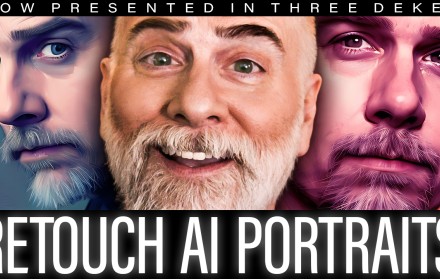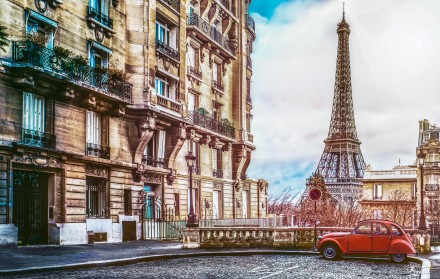It’s one thing to impeccably mask an image into a new scene. But it’s another to get the masked image to interact with its new environment. And oftentimes what that masked image needs is a shadow.
In this week’s technique, I show you how to capture and cast a shadow from one scene into another.
Garsh, this is a yummy one. Here’s the official description from lynda.com:
It’s all well and good to use Deke’s impeccable masking techniques to meticulously isolate an object—like, say, this week’s car—and set it down on a new background. But the fact is, if you don’t bring your object’s shadow along for the ride, that object is never going to look like it really belongs. As witnessed below:

Which is why, in this week’s free movie, Deke shows you how to capture the shadow under an object—like, say, the one under this week’s car—and prepare it for use against any background. The technique centers around the Calculations command (don’t worry, Photoshop does all the math) and some standard masking clean-up techniques. Check out the difference in these images, before (above) and after (below, with the shadow intact):

Moral of the story: Don’t leave your transported objects floating out in space. Ground them in reality by including their shadows.
Oh, and yeah. We’ll be back next week with another Deke’s Technique!
This is (as ever) an awesome technique unto itself. But it’s also a setup for something that’s coming in the future. I’m so excited! Stay tuned.



Thanks
Thank you very much
Mask a \“Reflection\”
Hi Deke!
First i wanna thank you for all your Techniques and courses on lynda.com.
Now my question, is it possible to Mask a “Reflection”? I mean a colorful not a one color Reflection .
I would appreciate a reply, thanks
The shadow knows
Another great technique. Thanks for sharing!
Blog Tips
This is (as ever) an awesome technique unto itself. But it’s also a setup for something that’s coming in the future. I’m so excited! Stay tuned.
HGH
Awesome Post…! i really like your blog nice information i read Thanks for sharing.! i bookmarked your blog and will come again soon!
Alpha Channel Selections
I love this video but get confused at the part where you select the shadow from the newly made alpha channel. How come when you fill the selected region with black it fills in the different shades of black(much darker right under the front bumper for example) like in the original shadow as opposed to just one uniform color? Also, how come it fills in a region that extends beyond the dotted lines? It almost seems rather than merely selecting a rough outline of the shadow and filling it in with black you instead actually copied the shadow. I think there’s something about alpha channels I’m not understanding.